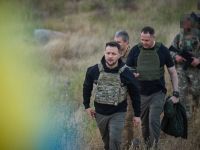The U.N.'s chief weapons inspector, Hans Blix Monday told the Security Council Iraq has not yet accepted the international demand to disarm.
He made this comment while delivering his report on his team's first 60 days work in Iraq.
Iraq apears "not to have come to a genuine acceptance of the disarmament demanded of it, and which it needs to carry out," Blix said.
However, Blix added that in some issues Iraq has been cooperating "rather well". He noted it appears that Iraq has decided to cooperate when it comes to the procedures and the "practical arrangements" of the inspections.
Inspectors had been allowed access to sites. He stressed the same type of cooperation is needed on "substance" -- in order to finish the work of disarming Iraq.
"It would appear from our experience so far that Iraq has decided in principle to provide cooperation on process, notably access. A similar decision is indispensable to provide cooperation on substance in order to bring the disarmament task to completion, through the peaceful process of inspection, and to bring the monitoring task on a firm course."
Touching on the question of how much time inspectors need, Blix said he shared "the sense of urgency" to achieve disarmament within "a reasonable period of time."
Blix said there were also question marks over Iraq's weapons declaration. Specifically, Blix said three questions remain unanswered:
* How much illicit weapons material might remain undeclared and intact from before the Persian Gulf War in 1991 and possibly thereafter.
*What, if anything, was illegally procured or produced.
*How the world can prevent any weapons of mass destruction from being produced or procured in the future.
Iraq has failed to account for large quantities of VX poison gas and anthrax it claims to have destroyed. He said there is "strong evidence" that Iraq maintained quantities of anthrax after it claimed to have destroyed its stocks.
Blix said the discovery of empty rocket artillery shells capable of carrying chemical weapons "show that Iraq needs to make more effort to ensure that its declaration is currently accurate."
Blix conveyed Iraq had refused to guarantee the safety of U.N. surveillance planes unless certain conditions were met. And he denied assertions by Iraqi officials that the inspectors are doing intelligence work.
Earlier, Secretary-General Kofi Annan urged the Security Council to give the inspectors "a reasonable amount of time" to do their work.
"If they need time, they should be given the time to do their work," Annan told reporters as he arrived at U.N. headquarters.
He said the arms experts should be given a "reasonable amount of time," adding "I am not saying forever but they do need time to do their work."
The Bush administration reacted coolly to this plea by Annan, warning again that "time is running out" for Saddam Hussein.
"When people say give them more time, the more time they get the more time they get the runaround," White House spokesman Ari Fleischer said. "Iraq is giving the inspectors the runaround."
Asked about Annan's plea, Fleischer said: "The president has not put a period of time on it. The president has said, though, that time is running out."
Fleischer hinted that whatever is in the inspectors' report to the Security Council, it will not change Bush's remarks on Iraq, or the overall speech. "I think it's pretty well set," he said.
The spokesman said the administration was combing the report for "one thing, very simple thing" — whether Iraq is complying with international demands to disarm.
He again declined to rule out American use of nuclear weapons against Iraq. "It is a serious concern about Saddam Hussein being armed with chemical and biological weapons and taking out millions," Fleischer said. "These aren't toys. These are weapons that inflict massive, gruesome casualties."
Fleischer said the United States believes there are ties between Iraq and al-Qaeda, and suggested that Bush will discuss those connections Tuesday night.
The spokesman added al-Qaeda prisoners have revealed that Iraq provided chemical weapons training to al-Qaeda. Asked if al-Qaeda members visited Iraq for training or if Iraqis went to Afghanistan, he said, "We have concerns about both."
"We know that Saddam Hussein has a long history of being involved in terrorism in general and there are some al-Qaida personnel who found refuge in Baghdad," Fleischer said. (Albawaba.com)
© 2003 Al Bawaba (www.albawaba.com)







